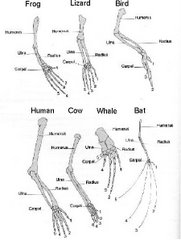THE NATURE OF SCIENCE AND BIOLOGY
Biology: The Science of Our Lives
Biology literally means "the study of life". Biology is such a broad field, covering the minute workings of chemical machines inside our cells, to broad scale concepts of ecosystems and global climate change. Biologists study intimate details of the human brain, the composition of our genes, and even the functioning of our reproductive system. Biologists recently all but completed the deciphering of the human genome, the sequence of deoxyribonucleic acid (DNA) bases that may determine much of our innate capabilities and predispositions to certain forms of behavior and illnesses. DNA sequences have played major roles in criminal cases (O.J. Simpson, as well as the reversal of death penalties for many wrongfully convicted individuals), as well as the impeachment of President Clinton (the stain at least did not lie). We are bombarded with headlines about possible health risks from favorite foods (Chinese, Mexican, hamburgers, etc.) as well as the potential benefits of eating other foods such as cooked tomatoes. Informercials tout the benefits of metabolism-adjusting drugs for weight loss. Many Americans are turning to herbal remedies to ease arthritis pain, improve memory, as well as improve our moods.
Can a biology book give you the answers to these questions? No, but it will enable you learn how to sift through the biases of investigators, the press, and others in a quest to critically evaluate the question. To be honest, five years after you are through with this class it is doubtful you would remember all the details of meatbolism. However, you will know where to look and maybe a little about the process of science that will allow you to make an informed decision. Will you be a scientist? Yes, in a way. You may not be formally trained as a science major, but you can think critically, solve problems, and have some idea about what science can and cannoit do. I hope you will be able to tell the shoe from the shinola.
Science and the Scientific Method
Science is an objective, logical, and repeatable attempt to understand the principles and forces operating in the natural universe. Science is from the Latin word, scientia, to know. Good science is not dogmatic, but should be viewed as an ongoing process of testing and evaluation. One of the hoped-for benefits of students taking a biology course is that they will become more familiar with the process of science.
Humans seem innately interested in the world we live in. Young children drive their parents batty with constant "why" questions. Science is a means to get some of those whys answered. When we shop for groceries, we are conducting a kind of scientific experiment. If you like Brand X of soup, and Brand Y is on sale, perhaps you try Brand Y. If you like it you may buy it again, even when it is not on sale. If you did not like Brand Y, then no sale will get you to try it again.
In order to conduct science, one must know the rules of the game (imagine playing Monopoly and having to discover the rules as you play! Which is precisely what one does with some computer or videogames (before getting the cheatbook). The scientific method is to be used as a guide that can be modified. In some sciences, such as taxonomy and certain types of geology, laboratory experiments are not necessarily performed. Instead, after formulating a hypothesis, additional observations and/or collections are made from different localities.
Steps in the scientific method commonly include:
Observation: defining the problem you wish to explain.
Hypothesis: one or more falsifiable explanations for the observation.
Experimentation: Controlled attempts to test one or more hypotheses.
Conclusion: was the hypothesis supported or not? After this step the hypothesis is either modified or rejected, which causes a repeat of the steps above.
After a hypothesis has been repeatedly tested, a hierarchy of scientific thought develops. Hypothesis is the most common, with the lowest level of certainty. A theory is a hypothesis that has been repeatedly tested with little modification, e.g. The Theory of Evolution. A Law is one of the fundamental underlying principles of how the Universe is organized, e.g. The Laws of Thermodynamics, Newton's Law of Gravity. Science uses the word theory differently than it is used in the general population. Theory to most people, in general nonscientific use, is an untested idea. Scientists call this a hypothesis.
Scientific experiments are also concerned with isolating the variables. A good science experiment does not simultaneously test several variables, but rather a single variable that can be measured against a control. Scientific controlled experiments are situations where all factors are the same between two test subjects, except for the single experimental variable.
Consider a commonly conducted science fair experiment. Sandy wants to test the effect of gangsta rap music on pea plant growth. She plays loud rap music 24 hours a day to a series of pea plants grown under light, and watered every day. At the end of her experiment she concludes gangsta rap is conducive to plant growth. Her teacher grades her project very low, citing the lack of a control group for the experiment. Sandy returns to her experiment, but this time she has a separate group of plants under the same conditions as the rapping plants, but with soothing Led Zeppelin songs playing. She comes to the same conclusion as before, but now has a basis for comparison. Her teacher gives her project a better grade.
sábado, 13 de enero de 2007
Suscribirse a:
Enviar comentarios (Atom)

No hay comentarios:
Publicar un comentario